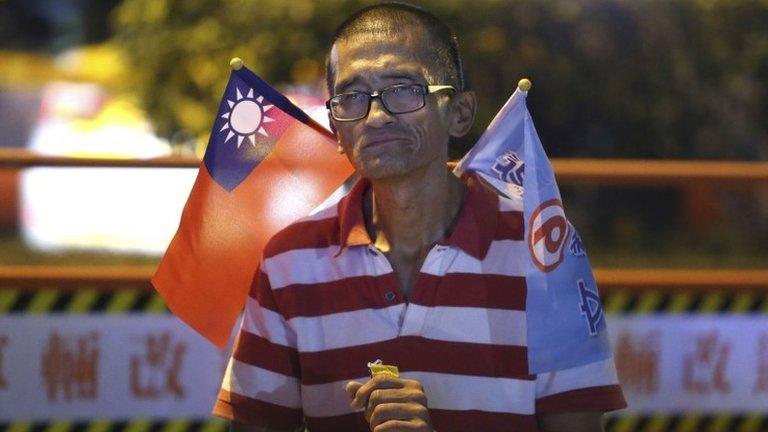The women who could lead Taiwan
- Published
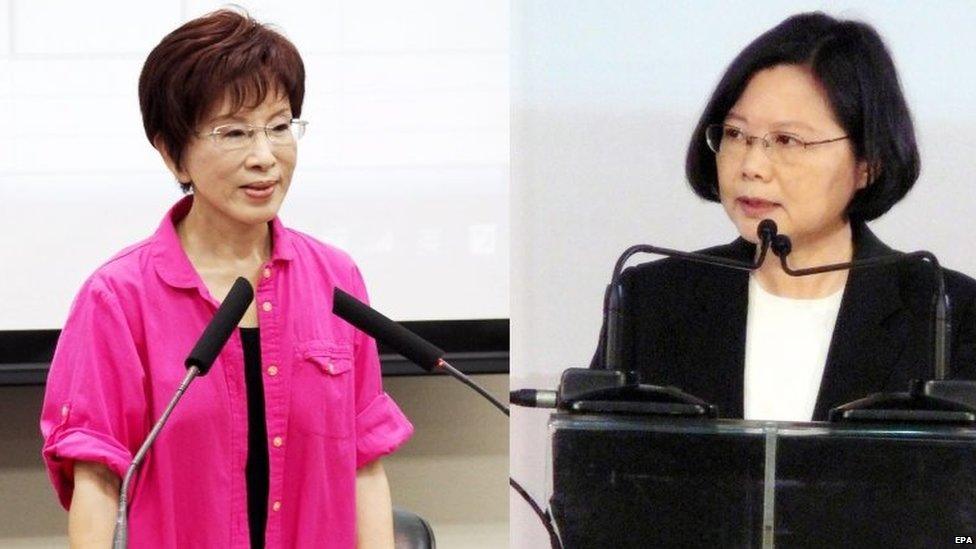
Kuomintang's Hung Hsiu-chu (L) will face Democratic Progressive Party's Tsai Ing-wen in the January elections
It's a first for Taiwan and a rarity for the world - two women competing for the presidency in the island's upcoming presidential race next January.
Taiwan's ruling party Kuomintang (KMT) has confirmed female deputy legislative speaker Hung Hsiu-chu, 67, as its candidate for the election. The opposition Democratic Progressive Party has already selected its chairwoman, Tsai Ing-wen, 58, as its candidate.
It means for the first time, the world's only Chinese democracy will have a female presidential race and very likely its first female president next year.
Rising through the ranks
This follows a trend in Asia of women being elected as national leaders, but unlike examples in other countries including Thailand, the Philippines and South Korea, neither of Taiwan's two female candidates have a father, brother, or husband who was already in political power.
Neither Ms Hung nor her opponent come from a politically active or influential family. Instead, both rose up the ranks over years in government.
Many see this as a sign of progress in the young democracy which only began allowing universal suffrage in presidential elections in the mid-1990s.
"Why can't woman hold up the sky? "asks Shi Dian-hsi, the owner of an auto repair shop.
"In the past, we've only seen men get nominated, but in this election, the men are all wishy-washy, and the women are more capable and courageous, that's why we support them."
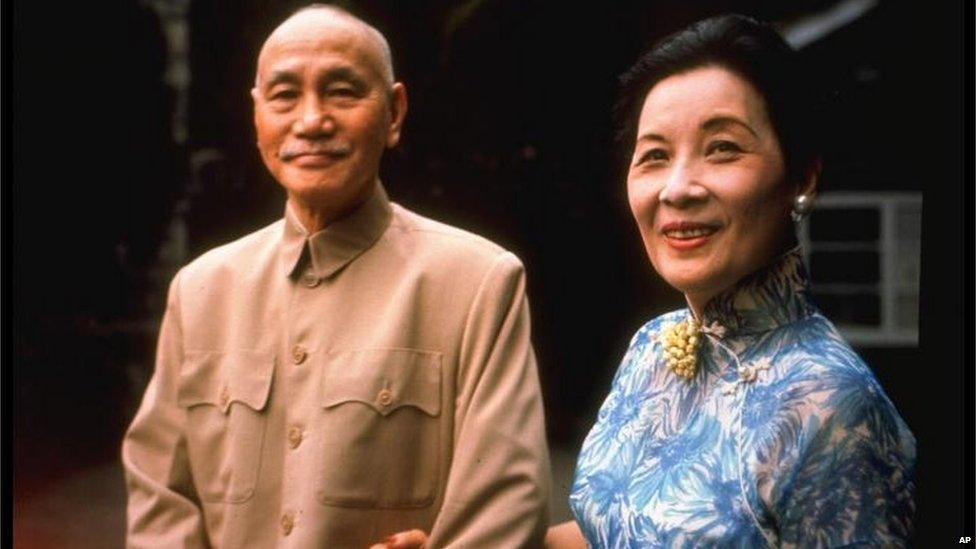
Soong Mei-ling played an influential role alongside her husband, Chiang Kai-shek
While the Republic of China (ROC) has never had a female leader since it was founded 100 years ago, women have played influential roles in its nation building or diplomacy.
They include Soong Ching-ling, the wife of the ROC's founder Dr Sun Yat-sen, as well as Soong Mei-ling, the wife of its later President Chiang Kai-shek.
Taiwan also had a female vice-president, Annette Lu, from 2000 to 2008. And the ROC's constitution stipulates quotas for women in its parliament, including a requirement that for each party, at least half of their elected legislators for at large seats must be female.
"The number of women politicians in Taiwan has long exceeded the quotas, but still more men are elected… there are still relatively few women in positions of power," said Yu Ching-hsin, a research fellow at National Cheng-chi University's Election Study Center.
"This election will change this. It's a good thing."
'Little hot pepper'
Both Ms Hung and Ms Tsai are seasoned politicians well-known to the Taiwanese public.
Nicknamed little hot pepper for her outspokenness, Ms Hung, a former high school teacher and counsellor, has been a loyal KMT member from a young age, later becoming deputy speaker in parliament.
She stepped up to the plate at a time when few in her party wanted to run after it suffered a crushing defeat in local elections last year.
Ms Tsai, a former professor and trained lawyer, served as vice-premier and head of the Mainland Affairs Council during a period of tense relations with China. She ran in the presidential race in 2012 and lost, but is leading in the opinion polls this time.
How the two candidates handle relations with China will be a key deciding factor in next year's presidential race.
While Ms Hung and her party favour closer ties with China, seeing it as crucial to Taiwan's economic growth, Ms Tsai and her party have raised fears that closer ties could threaten the island's sovereignty and independence.
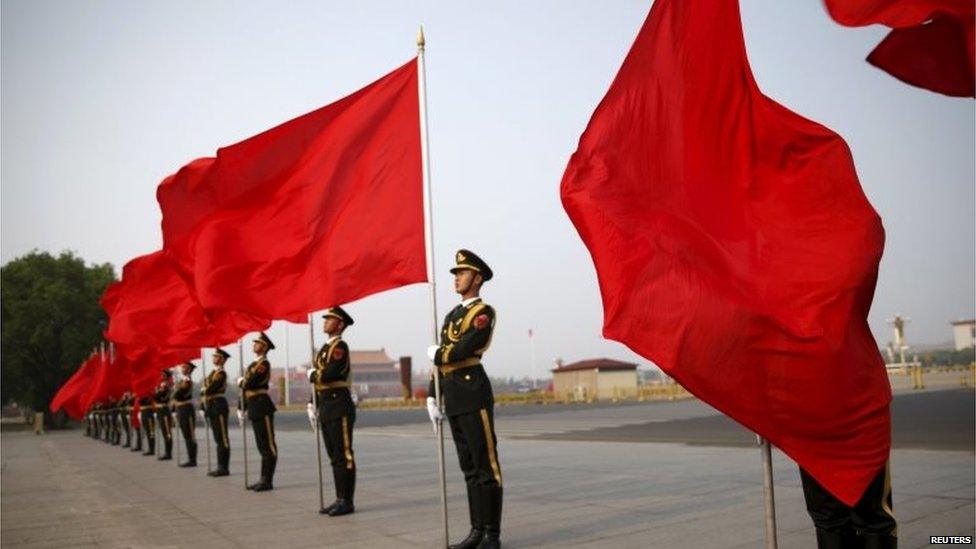
Whoever wins will have to decide how to work with an increasingly powerful Beijing
Demonstrators stormed and occupied Taiwan's parliament building last year in an unprecedented weeks-long protest sparked by worries that the ruling party's efforts to build stronger economic ties with China could turn the island into another Hong Kong.
So far, Beijing has kept a low profile regarding the election, not wanting to be seen as trying to influence the results. Such attempts in the past have backfired.
But many Chinese citizens, if not the government, are likely impressed by the fact that the ROC has two women running.
Mainland China, in contrast, has few women in positions of power, including none in the Communist party's top tier, its seven-member politburo standing committee. Taiwan could serve as a reminder to Beijing to promote more women in politics.
But regardless of which Taiwan candidate is elected, she will have to find a way to work with an increasingly powerful Beijing, which wants the island back one day, even though it has been ruled separately since the end of the Chinese civil war in 1949.
Fewer divisions?
Perhaps more important to voters, however, is how the candidates deal with pressing economic issues, including a stagnating economy, low wages and a widening wealth gap.
"I don't really care if it's a man or woman. What I care about is whether the candidate is capable and can make our country's economy better," said Lin Chia-chen, a 20-year-old college student who will vote for the first time.
Some believe that having a female president may reduce the divisions in Taiwanese society over China and other issues, but there is no guarantee this will happen.
After all, Taiwan's female politicians have been just as likely as their male counterparts to take part in Taiwan's notorious parliament shouting matches and scuffles over controversial issues.
"Looking at other countries, we see that if the president is a woman, the level of polarization is rather low and divisiveness drops, but we don't know why," said Lin Jih-wen, a research fellow at Academia Sinica's Institute of Political Science.
"We have seen this in Germany, Ireland and Finland, but we don't know if it will have a similar effect on Taiwan,"
Nonetheless, many hope that whoever leads will bring about harmony on this deeply divided island.
- Published19 July 2015
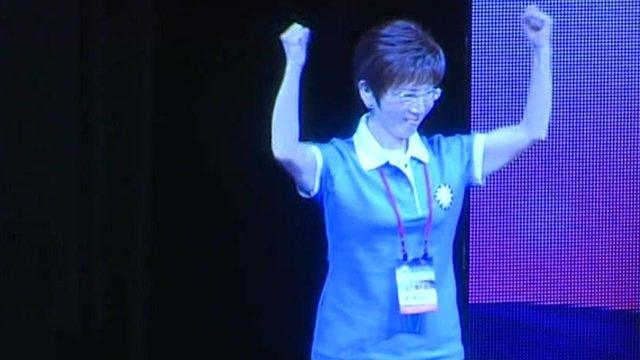
- Published1 December 2014
